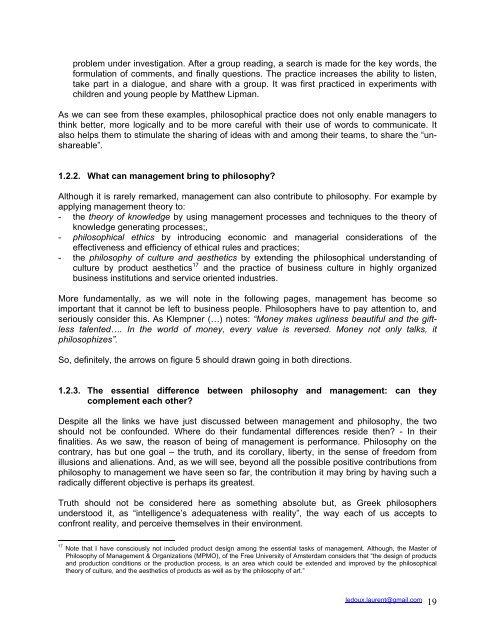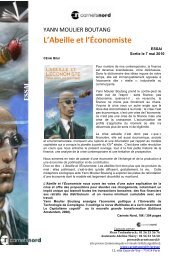Philosophy: The Managers - Philosophie Management
Philosophy: The Managers - Philosophie Management
Philosophy: The Managers - Philosophie Management
Create successful ePaper yourself
Turn your PDF publications into a flip-book with our unique Google optimized e-Paper software.
problem under investigation. After a group reading, a search is made for the key words, the<br />
formulation of comments, and finally questions. <strong>The</strong> practice increases the ability to listen,<br />
take part in a dialogue, and share with a group. It was first practiced in experiments with<br />
children and young people by Matthew Lipman.<br />
As we can see from these examples, philosophical practice does not only enable managers to<br />
think better, more logically and to be more careful with their use of words to communicate. It<br />
also helps them to stimulate the sharing of ideas with and among their teams, to share the “unshareable”.<br />
1.2.2. What can management bring to philosophy?<br />
Although it is rarely remarked, management can also contribute to philosophy. For example by<br />
applying management theory to:<br />
- the theory of knowledge by using management processes and techniques to the theory of<br />
knowledge generating processes;,<br />
- philosophical ethics by introducing economic and managerial considerations of the<br />
effectiveness and efficiency of ethical rules and practices;<br />
- the philosophy of culture and aesthetics by extending the philosophical understanding of<br />
culture by product aesthetics 17 and the practice of business culture in highly organized<br />
business institutions and service oriented industries.<br />
More fundamentally, as we will note in the following pages, management has become so<br />
important that it cannot be left to business people. Philosophers have to pay attention to, and<br />
seriously consider this. As Klempner (…) notes: “Money makes ugliness beautiful and the giftless<br />
talented…. In the world of money, every value is reversed. Money not only talks, it<br />
philosophizes”.<br />
So, definitely, the arrows on figure 5 should drawn going in both directions.<br />
1.2.3. <strong>The</strong> essential difference between philosophy and management: can they<br />
complement each other?<br />
Despite all the links we have just discussed between management and philosophy, the two<br />
should not be confounded. Where do their fundamental differences reside then? - In their<br />
finalities. As we saw, the reason of being of management is performance. <strong>Philosophy</strong> on the<br />
contrary, has but one goal – the truth, and its corollary, liberty, in the sense of freedom from<br />
illusions and alienations. And, as we will see, beyond all the possible positive contributions from<br />
philosophy to management we have seen so far, the contribution it may bring by having such a<br />
radically different objective is perhaps its greatest.<br />
Truth should not be considered here as something absolute but, as Greek philosophers<br />
understood it, as “intelligence’s adequateness with reality”, the way each of us accepts to<br />
confront reality, and perceive themselves in their environment.<br />
17<br />
Note that I have consciously not included product design among the essential tasks of management. Although, the Master of<br />
<strong>Philosophy</strong> of <strong>Management</strong> & Organizations (MPMO), of the Free University of Amsterdam considers that “the design of products<br />
and production conditions or the production process, is an area which could be extended and improved by the philosophical<br />
theory of culture, and the aesthetics of products as well as by the philosophy of art.”<br />
ledoux.laurent@gmail.com<br />
19
















